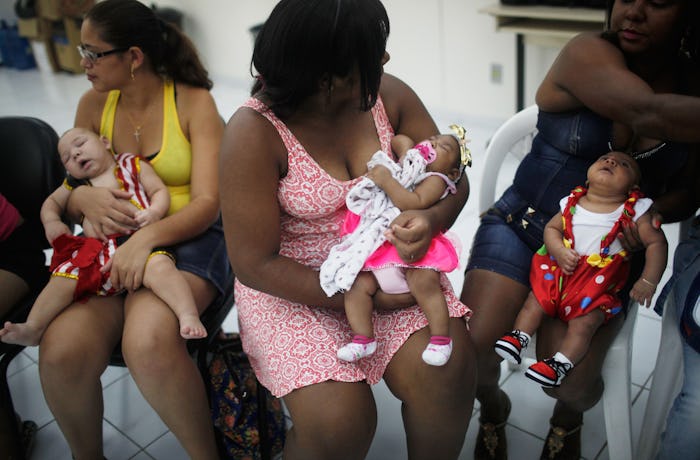Life

How Can A Toddler Get Zika? They Can Be Very Susceptible
In the United States, there have been 350 cases of the Zika virus, but so far they've all been traced back to travel to a Zika-affected country. But, health officials are predicting that the virus will spread in North America as temperatures rise for summer and the mosquito population booms. The cities that will be most at risk are southern, coastal places like Miami and New Orleans. Their municipal governments are already taking steps to prepare for the virus because of the threat it poses to pregnant women. But what are its risks for young children? How can a toddler get Zika?
According to The Centers for Disease Control and Prevention, the main method of transmission is the same at any age. The virus is carried by infected Aedes mosquitos, which bite day and night, indoors and outdoors. If a toddler is bitten by an infected mosquito, he or she may be more susceptible to developing symptoms like a high fever and a rash because young children generally have weaker immune systems.
Theoretically, blood transfusion and organ tissue transplant could be a method for Zika transmission, but there have been no cases so far that confirm that possibility for someone of any age.
There are two kinds of mother-to-infant transmission: perinatal and congenital. With Zika, congenital — when a mother is infected during her pregnancy — is the more serious of the two. Since the CDC has confirmed the link between Zika and the developmental defect microcephaly, women have been advised to be extremely cautious during pregnancy and use insect repellent. That said, according to CBS News, no one knows the likelihood of Zika transmission or birth defects if a mother is infected. While one study in French Polynesia showed that 1 percent of babies with infected mothers would have some developmental defect, another reported almost 30 percent. When it comes to congenital transmission, babies are most vulnerable during the first trimester, because that is when organs develop.
Perinatal transmission is when a pregnant woman is infected within two weeks of delivery and passes the virus to her child during labor. Unlike congenital transmission, this will most likely result in fever-like symptoms, if any.
As for breastfeeding, the CDC reported that traces of Zika virus RNA have been found in breast milk, "but attempts to culture the virus have been unsuccessful." That means that, at least for right now, breast milk doesn't appear to be a vehicle that transmits the virus. The CDC even said that "the benefits of breastfeeding outweigh the theoretical risks of Zika virus infection transmission through breast milk." Mothers are encouraged to continue breastfeeding, even in infected areas.
The best thing mothers can do to protect their toddlers is rid their yards of standing water and other mosquito breeding grounds, avoid travel to Zika-affected countries, and use insect repellent, mosquito nets, and screens in windows to keep the carriers at bay.